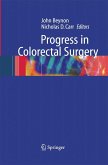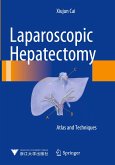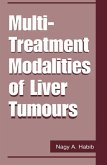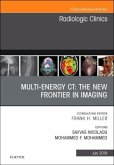The Iasgo Textbook of Multi-Disciplinary Management to Upper Gastrointestinal Diseases
Herausgegeben:Lin, Ming-Tsan; De Manzoni, Giovanni; Obama, Kazutaka; Guner, Ali; Takaori, Kyoichi; Duda, Dan G.
The Iasgo Textbook of Multi-Disciplinary Management to Upper Gastrointestinal Diseases
Herausgegeben:Lin, Ming-Tsan; De Manzoni, Giovanni; Obama, Kazutaka; Guner, Ali; Takaori, Kyoichi; Duda, Dan G.
- Gebundenes Buch
- Merkliste
- Auf die Merkliste
- Bewerten Bewerten
- Teilen
- Produkt teilen
- Produkterinnerung
- Produkterinnerung
This textbook provides insights into common benign and malignant diseases of the upper gastrointestinal tract, including the esophagus, stomach, and small intestine, covering anatomy, cancer, and functional diseases. Divided into 11 sections, the book offers up-to-date insights into epidemiology, physiology, pathology, diagnosis, treatment, and care with an emphasis on advanced treatments, including surgery, therapy, and radiotherapy, from both eastern and western perspectives. Chapters address specific conditions such as esophageal and gastric cancer, along with innovative approaches to…mehr
Andere Kunden interessierten sich auch für
![Ulcerative Colitis Ulcerative Colitis]() Ulcerative Colitis38,99 €
Ulcerative Colitis38,99 €![Progress in Colorectal Surgery Progress in Colorectal Surgery]() John Beynon / Nicholas D. Carr (eds.)Progress in Colorectal Surgery157,99 €
John Beynon / Nicholas D. Carr (eds.)Progress in Colorectal Surgery157,99 €![Laparoscopic Hepatectomy Laparoscopic Hepatectomy]() Xiujun CaiLaparoscopic Hepatectomy113,99 €
Xiujun CaiLaparoscopic Hepatectomy113,99 €![Multi Treatment Modalities of Liver Tumours Multi Treatment Modalities of Liver Tumours]() SchalkwijkMulti Treatment Modalities of Liver Tumours61,99 €
SchalkwijkMulti Treatment Modalities of Liver Tumours61,99 €![Multi-Energy Ct: The New Frontier in Imaging, an Issue of Radiologic Clinics of North America Multi-Energy Ct: The New Frontier in Imaging, an Issue of Radiologic Clinics of North America]() Savvas NicolaouMulti-Energy Ct: The New Frontier in Imaging, an Issue of Radiologic Clinics of North America90,99 €
Savvas NicolaouMulti-Energy Ct: The New Frontier in Imaging, an Issue of Radiologic Clinics of North America90,99 €![Multi-Factorial Approach as a Therapeutic Strategy for the Management of Alzheimer's Disease Multi-Factorial Approach as a Therapeutic Strategy for the Management of Alzheimer's Disease]() Multi-Factorial Approach as a Therapeutic Strategy for the Management of Alzheimer's Disease208,99 €
Multi-Factorial Approach as a Therapeutic Strategy for the Management of Alzheimer's Disease208,99 €![Benign Anorectal Diseases Benign Anorectal Diseases]() Giulio Aniello SantoroBenign Anorectal Diseases160,99 €
Giulio Aniello SantoroBenign Anorectal Diseases160,99 €-
-
-
This textbook provides insights into common benign and malignant diseases of the upper gastrointestinal tract, including the esophagus, stomach, and small intestine, covering anatomy, cancer, and functional diseases. Divided into 11 sections, the book offers up-to-date insights into epidemiology, physiology, pathology, diagnosis, treatment, and care with an emphasis on advanced treatments, including surgery, therapy, and radiotherapy, from both eastern and western perspectives. Chapters address specific conditions such as esophageal and gastric cancer, along with innovative approaches to surgery and systemic treatments. It also discusses key concepts in bariatric surgery, small intestine disorders, and postoperative care. The book is supplemented with ample illustrations to tackle the challenges of treating diseases in the upper gastrointestinal regions due to the complex anatomy, aggressive biological behavior, and poor prognosis.
The IASGO Textbook of Multi-Disciplinary Management to Upper Gastrointestinal Diseases aims to update academic and non-academic medical professionals, including gastroenterologists, gastrointestinal surgeons, general surgeons, radiation oncologists, medical oncologists, interventional radiologists, general practitioners, bariatric specialists, residents, medical students, and scientists, to gain insights into the understanding of upper gastrointestinal health and management.
The IASGO Textbook of Multi-Disciplinary Management to Upper Gastrointestinal Diseases aims to update academic and non-academic medical professionals, including gastroenterologists, gastrointestinal surgeons, general surgeons, radiation oncologists, medical oncologists, interventional radiologists, general practitioners, bariatric specialists, residents, medical students, and scientists, to gain insights into the understanding of upper gastrointestinal health and management.
Produktdetails
- Produktdetails
- Verlag: Springer / Springer Nature Singapore / Springer, Berlin
- Artikelnr. des Verlages: 978-981-96-1296-3
- Seitenzahl: 550
- Erscheinungstermin: 11. Januar 2026
- Englisch
- Abmessung: 279mm x 210mm
- ISBN-13: 9789819612963
- ISBN-10: 9819612969
- Artikelnr.: 72077880
- Herstellerkennzeichnung
- Libri GmbH
- Europaallee 1
- 36244 Bad Hersfeld
- gpsr@libri.de
- Verlag: Springer / Springer Nature Singapore / Springer, Berlin
- Artikelnr. des Verlages: 978-981-96-1296-3
- Seitenzahl: 550
- Erscheinungstermin: 11. Januar 2026
- Englisch
- Abmessung: 279mm x 210mm
- ISBN-13: 9789819612963
- ISBN-10: 9819612969
- Artikelnr.: 72077880
- Herstellerkennzeichnung
- Libri GmbH
- Europaallee 1
- 36244 Bad Hersfeld
- gpsr@libri.de
Dr. Ming-Tsan Lin is a professor and the chief of general surgery in the department of surgery at National Taiwan University Hospital, Taiwan. He is also the president of the Taiwan Society of Surgical Metabolism and Nutrition, and an emeritus president of the Taiwan Surgical Society of Gastroenterology, and founder and emeritus president of Taiwan Medical Altruistic Society. Dr. Lin is an expert in gastrointestinal surgery, minimally invasive surgery, surgical metabolism and nutrition, and hospital administration. Dr. Giovanni De Manzoni is a professor of surgery at Verona University and the director of the upper gastrointestinal surgery unit at Verona University Hospital, Italy. He is the founding member of the Italian Research Group for Gastric Cancer (GIRCG) under which he has coordinated numerous research projects on the surgical and multimodal treatment of gastric cancer. Dr. Manzoni was the president of the International Gastric Cancer Association (IGCA) and works as an editor-in-chief of the gastric cancer journal. Dr. Kazutaka Obama is a professor at the department of surgery, Kyoto University Graduate School of Medicine, Japan. He is an expert in minimally invasive upper gastrointestinal surgery, with a specialization in robotic gastrectomy. Currently, he is involved in conducting domestic and international multicenter clinical studies, researching novel treatments for gastric and colorectal cancers, and developing an integrated surgical education system for robotic surgery. Dr. Obama has published several articles on the advancement of gastrointestinal surgical research in peer-reviewed national and international journals. Dr. Ali Guner is a Professor of Surgery at Karadeniz Technical University, Turkey, where he leads the upper gastrointestinal surgery unit. With a PhD in Biostatistics and Medical Informatics, he brings a unique blend of surgical expertise and data analysis skills to his work. Dr. Guner's research interests span a wide range of gastric cancer treatment, quality improvement in healthcare, patient safety protocols, advanced biostatistics, and artificial intelligence applications in medicine. He has authored numerous articles in peer-reviewed national and international journals, focusing on gastric cancer and innovative surgical approaches. Dr. Kyoichi Takaori is the chief executive officer (C.E.O) of Nagahama City Hospital Network, president of Nagahama City Hospital, and professor at Asahi University, Japan. He has made significant contributions to the development of surgical techniques for pancreatic and upper gastrointestinal diseases through open, laparoscopic, and robotic approaches. Currently, Dr. Takaori is the secretary general of the International Association of Surgeons, Gastroenterologists and Oncologists (IASGO) and secretary-elect of the International Association of Pancreatology. Currently, Dr. Takaori is the Secretary General of the International Association of Surgeons, Gastroenterologists and Oncologists (IASGO) and Secretary of the International Association of Pancreatology. Dr. Dan G. Duda is a professor at the Harvard Medical School, an investigator at Massachusetts General Hospital Research Institute, and the director of translational research in gastrointestinal radiation oncology at Massachusetts General Hospital, Boston, USA. Dr. Duda is an expert in combinatorial strategies for gastrointestinal malignancies and serves as Secretary General of the International Association of Surgeons, Gastroenterologists and Oncologists (IASGO).
Part 1 -Anatomy and Physiology of the Upper Gastrointestinal Tract.- 1 Three-Dimensional Surgical Anatomy for Minimally Invasive Surgery in the Upper Gastrointestinal Tract: Patient-Specific Considerations.- 2 Physiology and function of upper gastrointestinal tract.- Part 2 Esophageal Cancer and Neoplasms.- 3 Epidemiology & Pathophysiology of Esophageal Cancer.- 4 Surgical principle for esophageal cancer.- 5 Endoscopic treatment for esophageal cancer.- 6 Minimally invasive surgery for esophageal cancer: Eastern view.- 7 Minimal invasive surgery: Western view.- 8 Neoadjuvant and adjuvant therapy for esophageal cancer.- 9 Chemotherapy for esophageal cancer: Current Practice and Perspectives in Korea.- 10 Systemic Treatment for esophageal cancer: Chemotherapy, Targeted Therapy, and Immunotherapy.- 11 Radiotherapy for esophageal cancer: Current practice and perspectives in the West.- 12 Radiotherapy for esophageal cancer: Current practice and perspective in the East.- 13 Palliative treatment for esophageal cancer.- 14 Esophageal Gastrointestinal Stromal Tumor and Leiomyoma.- Part 3 Functional Disorders and Other Esophageal Conditions.- 15 Modern diagnosis and treatment of gastroesophageal reflux disease.- 16 Hiatal hernia.- 17 Achalasia.- 18 Overcoming Esophageal Perforation: A Comprehensive Guide to Diagnosis, Treatment, and Recovery.- 19 Esophageal Stricture: A Comprehensive Guide to Understanding, Managing, and Treating Esophageal Narrowing.- 20 Caustic Injury in the Gastrointestinal Tract.- Part 4 Cancers of the Esophagogastric Junction.- 21 Progress in the management of adenocarcinoma of the esophagogastric junction in Japan: The past, present, and future perspectives.- 22 Western view for esophagogastric junction cancer.- Part 5 Gastric cancer.- 23 Epidemiology, pathophysiology, and clinical application of gastric cancer.- 24 Helicobacter pylori in gastric cancer.- 25 Genomic Classification of Gastric Cancer.- 26 Surgical principle for early and advance gastric cancer.- 27 Endoscopic treatment for gastric cancer.- 28 Minimal invasive surgery for gastric cancer.- 29 Function preserved surgery for gastric cancer.- 30 Delta anastomosis after distal gastrectomy.- 31 Roux-en-Y anastomosis after distal gastrectomy.- 32 Differences in the treatments for esophagogastric junction, non-esophagogastric junction, and remnant gastric cancer.- 33 Poorly Cohesive gastric cancer: toward clinically relevant molecular-based morphological classification as a guide to treatment.- 34 Systemic Therapies for Gastric Cancer: Western View.- 35 Systemic treatment for gastric cancer: Eastern views.- 36 Radiotherapy for gastric cancer.- 37 Oligometastatic Gastric Cancer Treatment.- 38 Intraperitoneal chemotherapy for gastric cancer: hyperthermia, normothermia.- 39 Antiangiogenic Treatment for Gastric Cancers.- 40 Palliative treatment for gastric cancer.- Part 6 Neoplasms of the Stomach.- 41 Gastrointestinal stromal tumor in stomach.- 42 Treatment of Upper Gastrointestinal Neuroendocrine Neoplasms.- Part 7 Miscellaneous Gastric Disorders.- 43 Upper gastrointestinal haemorrhage.- 44 Postgastrectomy syndromes.- Part 8 Bariatric and Metabolic Surgery.- 45 Pathophysiology and Management of Obesity.- 46 Traditional and novel bariatric surgery.- 47 Benefits of Metabolic and Bariatric Surgery.- 48 Revisional bariatric surgery.- Part 9 Diseases of the Small Intestine.- 49 Management of small intestine tumors- what surgeons need to know.- 50 Ileus & Obstruction.- 51 Incisional hernia.- 52 Mesenteric Ischemia.- 53 Inflammatory bowel disease.- Part 10 Modern Perioperative Strategies.- 54 Enhanced Recovery After Surgery for Gastrectomy.- 55 Nutrition and metabolism in upper gastrointestinal surgery.- 56 Telecare in digestive surgery: current development and future direction.
Part 1 -Anatomy and Physiology of the Upper Gastrointestinal Tract.- 1 Three-Dimensional Surgical Anatomy for Minimally Invasive Surgery in the Upper Gastrointestinal Tract: Patient-Specific Considerations.- 2 Physiology and function of upper gastrointestinal tract.- Part 2 Esophageal Cancer and Neoplasms.- 3 Epidemiology & Pathophysiology of Esophageal Cancer.- 4 Surgical principle for esophageal cancer.- 5 Endoscopic treatment for esophageal cancer.- 6 Minimally invasive surgery for esophageal cancer: Eastern view.- 7 Minimal invasive surgery: Western view.- 8 Neoadjuvant and adjuvant therapy for esophageal cancer.- 9 Chemotherapy for esophageal cancer: Current Practice and Perspectives in Korea.- 10 Systemic Treatment for esophageal cancer: Chemotherapy, Targeted Therapy, and Immunotherapy.- 11 Radiotherapy for esophageal cancer: Current practice and perspectives in the West.- 12 Radiotherapy for esophageal cancer: Current practice and perspective in the East.- 13 Palliative treatment for esophageal cancer.- 14 Esophageal Gastrointestinal Stromal Tumor and Leiomyoma.- Part 3 Functional Disorders and Other Esophageal Conditions.- 15 Modern diagnosis and treatment of gastroesophageal reflux disease.- 16 Hiatal hernia.- 17 Achalasia.- 18 Overcoming Esophageal Perforation: A Comprehensive Guide to Diagnosis, Treatment, and Recovery.- 19 Esophageal Stricture: A Comprehensive Guide to Understanding, Managing, and Treating Esophageal Narrowing.- 20 Caustic Injury in the Gastrointestinal Tract.- Part 4 Cancers of the Esophagogastric Junction.- 21 Progress in the management of adenocarcinoma of the esophagogastric junction in Japan: The past, present, and future perspectives.- 22 Western view for esophagogastric junction cancer.- Part 5 Gastric cancer.- 23 Epidemiology, pathophysiology, and clinical application of gastric cancer.- 24 Helicobacter pylori in gastric cancer.- 25 Genomic Classification of Gastric Cancer.- 26 Surgical principle for early and advance gastric cancer.- 27 Endoscopic treatment for gastric cancer.- 28 Minimal invasive surgery for gastric cancer.- 29 Function preserved surgery for gastric cancer.- 30 Delta anastomosis after distal gastrectomy.- 31 Roux-en-Y anastomosis after distal gastrectomy.- 32 Differences in the treatments for esophagogastric junction, non-esophagogastric junction, and remnant gastric cancer.- 33 Poorly Cohesive gastric cancer: toward clinically relevant molecular-based morphological classification as a guide to treatment.- 34 Systemic Therapies for Gastric Cancer: Western View.- 35 Systemic treatment for gastric cancer: Eastern views.- 36 Radiotherapy for gastric cancer.- 37 Oligometastatic Gastric Cancer Treatment.- 38 Intraperitoneal chemotherapy for gastric cancer: hyperthermia, normothermia.- 39 Antiangiogenic Treatment for Gastric Cancers.- 40 Palliative treatment for gastric cancer.- Part 6 Neoplasms of the Stomach.- 41 Gastrointestinal stromal tumor in stomach.- 42 Treatment of Upper Gastrointestinal Neuroendocrine Neoplasms.- Part 7 Miscellaneous Gastric Disorders.- 43 Upper gastrointestinal haemorrhage.- 44 Postgastrectomy syndromes.- Part 8 Bariatric and Metabolic Surgery.- 45 Pathophysiology and Management of Obesity.- 46 Traditional and novel bariatric surgery.- 47 Benefits of Metabolic and Bariatric Surgery.- 48 Revisional bariatric surgery.- Part 9 Diseases of the Small Intestine.- 49 Management of small intestine tumors- what surgeons need to know.- 50 Ileus & Obstruction.- 51 Incisional hernia.- 52 Mesenteric Ischemia.- 53 Inflammatory bowel disease.- Part 10 Modern Perioperative Strategies.- 54 Enhanced Recovery After Surgery for Gastrectomy.- 55 Nutrition and metabolism in upper gastrointestinal surgery.- 56 Telecare in digestive surgery: current development and future direction.








